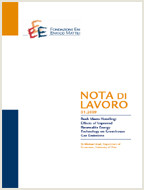Household Responses to Individual Shocks: Disability and Labor Supply

01.09.2009
Giovanni Gallipoli, Laura Turner
D13, I10, J12, J22
Idiosyncratic Risk, Disability, Life Cycle Labor Supply, Intrahousehold Insurance
Economy and Society
Gianmarco I.P. Ottaviano
What are idiosyncratic shocks and how do people respond to them? This paper starts from the observation that idiosyncratic shocks are experienced at the individual level, but responses to shocks can encompass the whole household. Understanding and accurately modeling these responses is essential to the analysis of intra-household allocations, especially labor supply. Using longitudinal data from the Canadian Survey of Labour and Income Dynamics (SLID) we exploit information about disability and health status to develop a life-cycle framework which rationalizes observed responses of household members to idiosyncratic shocks. Two puzzling findings associated to disability onset motivate our work: (1) the almost complete absence of `added worker’ effects within households and, (2) the fact that single agents’ labor supply responses to disability shocks are larger and more persistent than those of married agents. We show that a first-pass, basic model of the household has predictions about dynamic labor supply responses which are at odds with these facts; despite such failure, we argue that these facts are consistent with optimal household behavior when we account for two simple mechanisms: the first mechanism relates to selection into and out of marriage, while the second hinges on insurance transfers taking place within households. We show that these mechanisms arise naturally when we allow for three features: a linkage between human capital accumulation and life-cycle labor supply, endogenous marriage contracts and the possibility of time transfers between partners. We also report evidence that the extended model with endogenous marriage contracts can fit divorce patterns observed in Canadian data, as well as correlations between disability prevalence and marital status, providing an ideal framework to study intra-household risk-sharing with limited commitment.
